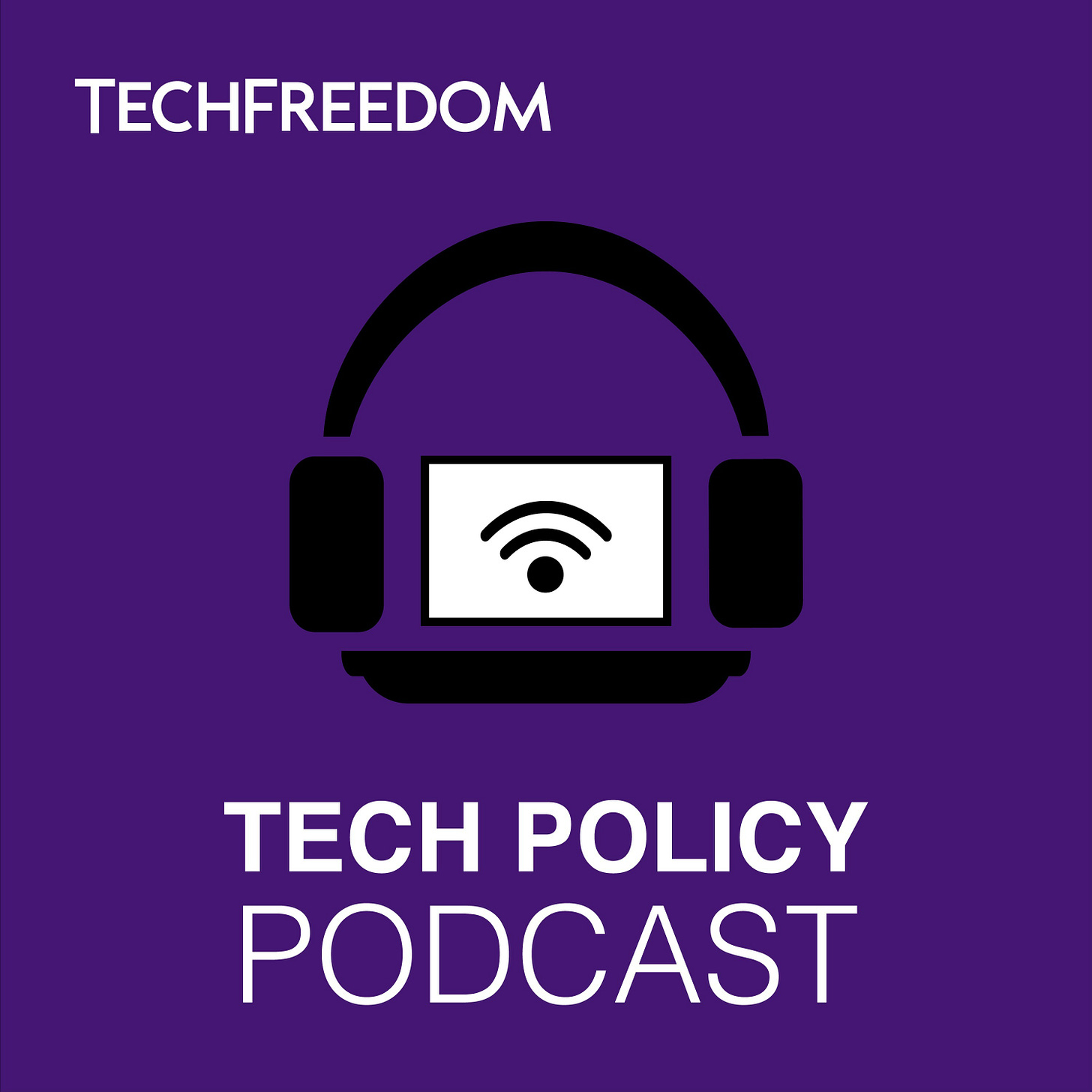More Tech Policy Than You Can Poke a Stick At
Podcast episodes of note.
Hello! I’m still proudly at the helm of the Tech Policy Podcast. Already knew that? Look at you. Thanks for listening. Fun fact: If you leave a five-star rating and a good review, you will live a long life.
Never tuned in before? You are forgiven. Now let’s begin. Here is a starter pack—ten episodes, from the past year, that are especially worth your time:
#385: AI Snake Oil. In AI circles, Arvind Narayanan and Sayash Kapoor (Princeton) are everywhere these days. I first encountered them through a sharp article they wrote on the silliness of “p(doom)”—people’s made up and basically incoherent guesses of the numerical probability that AI will kill us. Then I learned they had a book on the way: AI Snake Oil. It’s excellent. Clear-eyed about both AI’s limits and its promise. Kapoor joined me to talk through the book, helping me separate hype from reality.
#389: The Rise of the Compliant Speech Platform. Friend of the show Daphne Keller (Stanford Law) wrote a terrific essay for Lawfare on how content moderation is mutating into a compliance function. Picture the kind of box-checking that consumes banks and insurance companies. As she explained, decisions about speech are increasingly being turned into standardized, regulator-friendly paperwork. She joined me to unpack the piece. As always with Daphne, the conversation wandered into delightful and unexpected intellectual territory.
#395: The Digital Fourth Amendment. Orin Kerr (Stanford Law), the country’s foremost Fourth Amendment scholar, came on to discuss his new book on how the Fourth Amendment works in the digital age. This one sells itself.
#396: The Cybersecurity Crisis. The Chinese Communist Party has wormed into our telecom networks, intercepting top officials’ calls and texts. Worse, it has seeded our critical infrastructure with dormant malware. And yet everyone just shrugs! WTF. If the CCP ever launches a massive cyberattack, we’ll regret how much energy we poured into culture-war nonsense. I was delighted to speak with Maggie Miller (Politico), one of the few reporters paying proper attention. Don’t know what Salt Typhoon is? Listen to this.
#399: What the TikTok Ruling Should Have Said. The Supreme Court’s ruling in TikTok v. Garland was both unanimous and wrong. What happened? In my view, the justices simply decided the wrong case. Americans have the right to read, watch, and listen to what they choose, free of government meddling. The Court dodged that fundamental point. In a very special episode, Jeff Fisher (Stanford Law), who argued before the justices on behalf of TikTok users, sketched out the TikTok ruling that should have been. (Disclosure time: I now sit on TikTok’s US Content Advisory Council. Call that a conflict if you wish. The TikTok ruling still stinks.)
#404: The Worst Possible Moment to Break Encryption. A solo rant. The UK tried—then, thankfully, backed off—forcing Apple to break iCloud’s end-to-end encryption. Terrible idea at the best of times; sheer madness now. (Do they know who the president is over here?) In this one, I dig into why encryption matters, the erosion of free expression on both sides of the Atlantic, and lawmakers’ benighted quest to control the internet.
#405: No, Internet Age Verification Has Not Been “Solved.” Somehow the idea has gotten about that safe, easy, accurate age verification is close to hand. Eric Goldman (Santa Clara Law) joins me to explain why this is wishful thinking. There is no deus ex machina in the offing. A “papers please” internet would be a disaster for privacy and civil liberties.
#409: The FTC’s Quixotic Social Media Inquiry. Remember the conservative freak-out over social-media “censorship”? Much of the right has moved on, but FTC chair Andrew Ferguson wants to keep the party going. His agency asked the public to submit gripes that might—somehow—be spun into a Section 5 competition or deception case. Mike Masnick (Techdirt) joins Santana Boulton (TechFreedom’s own) and me. We break down this sad effort to keep riding an exhausted narrative.
#413: AI: Things Are About to Get Weird. Think of this one as AI Snake Oil’s evil twin. Casting skepticism to the wind, I argue that AI will upend culture—and fast. Google’s Veo 3 video generator, followed closely by a torrent of AI video on social media, convinced me that big shifts are coming. Readers of “AI and the End of the World” and “More Thoughts on AI” will recognize the theme. Richard Morrison (CEI) joins me for a mind-bending meditation on what this new world might look like.
#416: Britain Censors the Internet (and More). Hot off the press: another episode on the UK. What the hell is going on over there? More than a thousand people a month are being arrested for what they say online. And now the Online Safety Act’s “child protection” mandates are triggering a fresh wave of censorship. Shoshana Weissmann (R Street) and I try to make sense of Britain’s free-speech omnishambles.


